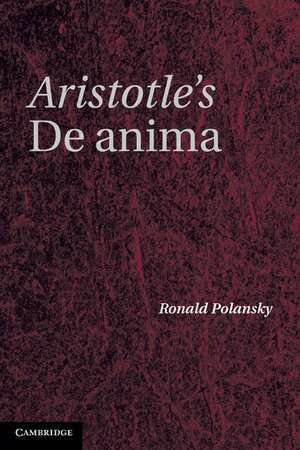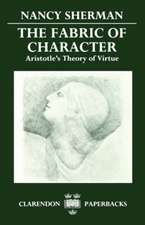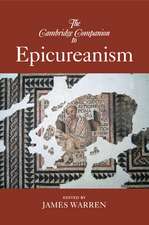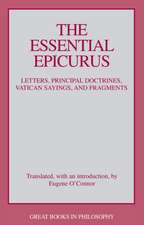Aristotle's De Anima: A Critical Commentary
Autor Ronald Polanskyen Limba Engleză Paperback – 4 iul 2010
| Toate formatele și edițiile | Preț | Express |
|---|---|---|
| Paperback (1) | 289.30 lei 6-8 săpt. | |
| Cambridge University Press – 4 iul 2010 | 289.30 lei 6-8 săpt. | |
| Hardback (1) | 901.62 lei 6-8 săpt. | |
| Cambridge University Press – 23 sep 2007 | 901.62 lei 6-8 săpt. |
Preț: 289.30 lei
Nou
Puncte Express: 434
Preț estimativ în valută:
55.36€ • 59.20$ • 46.16£
55.36€ • 59.20$ • 46.16£
Carte tipărită la comandă
Livrare economică 17 aprilie-01 mai
Preluare comenzi: 021 569.72.76
Specificații
ISBN-13: 9780521148856
ISBN-10: 0521148855
Pagini: 598
Dimensiuni: 152 x 229 x 34 mm
Greutate: 0.91 kg
Editura: Cambridge University Press
Colecția Cambridge University Press
Locul publicării:New York, United States
ISBN-10: 0521148855
Pagini: 598
Dimensiuni: 152 x 229 x 34 mm
Greutate: 0.91 kg
Editura: Cambridge University Press
Colecția Cambridge University Press
Locul publicării:New York, United States
Cuprins
Introduction; 1. The De Anima and self-knowledge; 2. Study of soul in relation to physics; 3. The cognitive faculties and physics; 4. Aristotle's procedures and the quest for thoroughness; 5. Background assumptions for study of the soul; 6. The truth and interest of the De Anima; 7. The text of the De Anima; Book 1: 1. The nobility and difficulty of study of soul. Its connection with body; 2. The predecessors' use of soul to account for motion and perception; 3. Criticism of predecessors' way of accounting for motion; 4. Criticism of the harmonia view as an account of motion; 5. Criticism of predecessors' way of accounting for cognition; Book 2: 1. Definition of soul; 2. What is life?; 3. How powers of soul are distributed and united in the soul; 4. The nutritive faculty, its object and subfaculties; 5. Clarification of being affected, living as saving, and the first definition of sense; 6. The three sorts of sensible objects; 7. Vision, its medium, and object; 8. Hearing, sound, and voice; 9. Smell and odor; 10. Taste is a contact sense. The tasteable; 11. Touch, the tangibles, and sense as a mean; 12. Definition of sense and whether sensibles affect non-perceiving bodies; Book 3: 1. In the world as it is there can be but the five senses; 2. What allows for perceiving that we perceive? Sense comes together in a common power so that the five senses are subfaculties of a central sense faculty; 3. Distinguishing sense and thought. What is phantasia?; 4. What is mind as that capable of thinking all things; 5. What enables thinking to occur; 6. The sorts of intelligible objects; 7. Phantasia has a role in all thinking; 8. The mind can think all things; 9. There is a capacity for progressive motion; 10. The desiderative capacity is the primary cause of progressive motion; 11. Even the simplest animals have indefinite phantasia and calculative phantasia fits the account of progressive motion; 12. The necessary order of the faculties of the soul; 13. The sort of body requisite to support the order of the faculties of soul; Bibliography.
Recenzii
'Reading Polansky's commentary is a satisfying venture, regardless of whether or not one agrees with the author's insights. His careful arguments, the richness of his secondary sources, and his pedagogical style invite thought and further research. Polansky's commentary will remain a necessary book to be consulted by the researcher of the De Anima.' Bryn Mawr Classical Review
Notă biografică
Descriere
Aristotle's De Anima was the first systematic philosophical account of the soul and its faculties.














